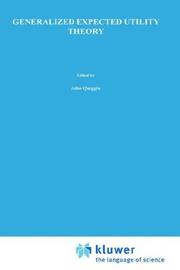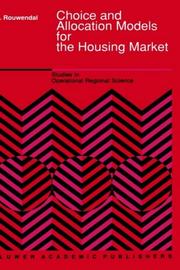| Listing 1 - 10 of 183 | << page >> |
Sort by
|

ISBN: 0792393023 9780792393023 Year: 1993 Publisher: Boston: Kluwer Academic Publishers,
Abstract | Keywords | Export | Availability | Bookmark
 Loading...
Loading...Choose an application
- Reference Manager
- EndNote
- RefWorks (Direct export to RefWorks)
Book
ISBN: 0813813557 9780813813554 Year: 1972 Publisher: Ames: Iowa state university press,
Abstract | Keywords | Export | Availability | Bookmark
 Loading...
Loading...Choose an application
- Reference Manager
- EndNote
- RefWorks (Direct export to RefWorks)
Book
Year: 2004 Publisher: Washington, DC : World Bank,
Abstract | Keywords | Export | Availability | Bookmark
 Loading...
Loading...Choose an application
- Reference Manager
- EndNote
- RefWorks (Direct export to RefWorks)
A number of studies have examined the implications of preference interdependence. This paper models individual utility as depending either on the level of other people's consumption or on the difference in consumption levels. It assumes that the impact of an increase in other people's consumption on individual utility diminishes with the level of consumption, raising individual utility when that consumption is very small and lowering it when that consumption is very large. Based on that plausible assumption, the paper shows that, whether individual utility depends on the level of other people's consumption or on the difference in consumption levels, (1) welfare declines with inequality, (2) equilibrium inequality is inefficient, and (3) the optimal intervention leads to a more equal distribution. Implications for the role of development institutions are examined. This paper--a product of the Trade Team, Development Research Group--is part of a larger effort in the group to examine the impact of inequality on efficiency.
Book
Year: 2004 Publisher: Washington, DC : World Bank,
Abstract | Keywords | Export | Availability | Bookmark
 Loading...
Loading...Choose an application
- Reference Manager
- EndNote
- RefWorks (Direct export to RefWorks)
A number of studies have examined the implications of preference interdependence. This paper models individual utility as depending either on the level of other people's consumption or on the difference in consumption levels. It assumes that the impact of an increase in other people's consumption on individual utility diminishes with the level of consumption, raising individual utility when that consumption is very small and lowering it when that consumption is very large. Based on that plausible assumption, the paper shows that, whether individual utility depends on the level of other people's consumption or on the difference in consumption levels, (1) welfare declines with inequality, (2) equilibrium inequality is inefficient, and (3) the optimal intervention leads to a more equal distribution. Implications for the role of development institutions are examined. This paper--a product of the Trade Team, Development Research Group--is part of a larger effort in the group to examine the impact of inequality on efficiency.
Book
ISBN: 0203742478 1135009732 Year: 2013 Publisher: New York : Routledge,
Abstract | Keywords | Export | Availability | Bookmark
 Loading...
Loading...Choose an application
- Reference Manager
- EndNote
- RefWorks (Direct export to RefWorks)
Utility-based theory and the fallback choice-theoretic framework are shown to be biased, irremediably flawed and misleading. A radically different theory of value and of consumer behaviour is proposed based on existential interpretations of scarcity, value and self-interest. For self-conscious mortals, only time is scarce. All other is derivative scarcity. Value is in the life, as a knowledge extract of time, which goes into commodities as direct human labour and depreciated capital, through their production. By structuring their preferences, consumers try to confiscate more of such
Utility theory. --- Value. --- Economics.
Book
ISBN: 1009198297 1009198262 Year: 2023 Publisher: Cambridge : Cambridge University Press,
Abstract | Keywords | Export | Availability | Bookmark
 Loading...
Loading...Choose an application
- Reference Manager
- EndNote
- RefWorks (Direct export to RefWorks)
This Element offers an accessible but technically detailed review of expected utility theory (EU), which is a model of individual decision-making under uncertainty that is central for both economics and philosophy. The Element's approach falls between the history of ideas and economic methodology. At the historical level, it reviews EU by following its conceptual evolution from its original formulation in the eighteenth century through its transformations and extensions in the mid-twentieth century to its more recent supersession by post-EU theories such as prospect theory. In reconstructing the history of EU, it focuses on the methodological issues that have accompanied its evolution, such as whether the utility function and the other components of EU correspond to actual mental entities. On many of these issues, no consensus has yet been reached, and in this Element the author offers his view on them.
Book
ISBN: 0140808760 9780140808766 Year: 1973 Publisher: Harmondsworth Penguin
Abstract | Keywords | Export | Availability | Bookmark
 Loading...
Loading...Choose an application
- Reference Manager
- EndNote
- RefWorks (Direct export to RefWorks)
Distributive justice. --- Income distribution. --- Utility theory --- Taxation
Book
ISBN: 9780199372768 9780199372775 0199372772 0199372764 Year: 2019 Publisher: New York, N.Y. Oxford University Press
Abstract | Keywords | Export | Availability | Bookmark
 Loading...
Loading...Choose an application
- Reference Manager
- EndNote
- RefWorks (Direct export to RefWorks)
Book
ISBN: 9780333662601 0333662601 Year: 1997 Publisher: London: MacMillan,
Abstract | Keywords | Export | Availability | Bookmark
 Loading...
Loading...Choose an application
- Reference Manager
- EndNote
- RefWorks (Direct export to RefWorks)
Decision making --- Utility theory --- Game theory --- Risk

ISBN: 0792304667 9780792304661 Year: 1989 Publisher: Dordrecht: Kluwer Academic Publishers,
Abstract | Keywords | Export | Availability | Bookmark
 Loading...
Loading...Choose an application
- Reference Manager
- EndNote
- RefWorks (Direct export to RefWorks)
| Listing 1 - 10 of 183 | << page >> |
Sort by
|

 Search
Search Feedback
Feedback About
About Help
Help News
News